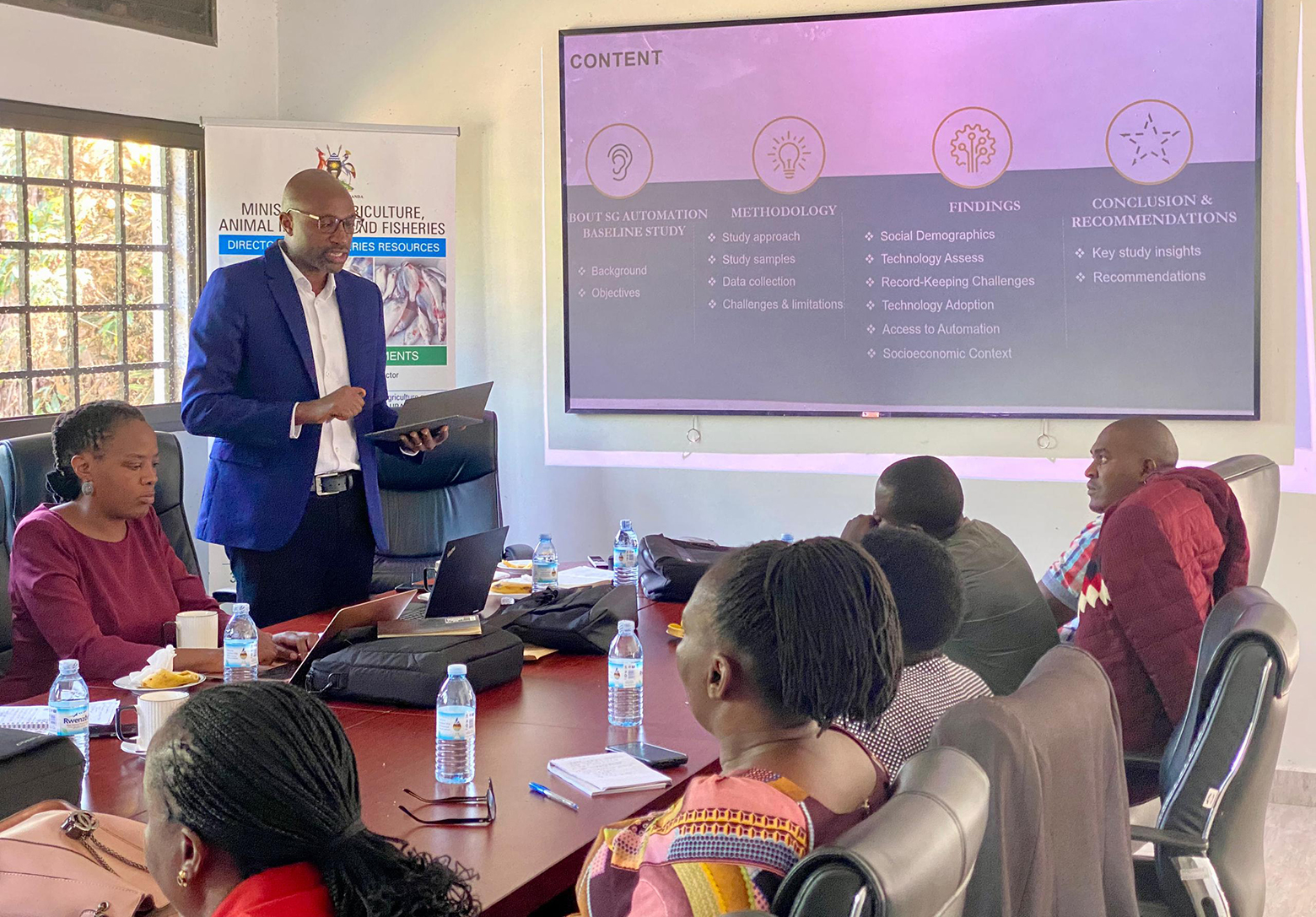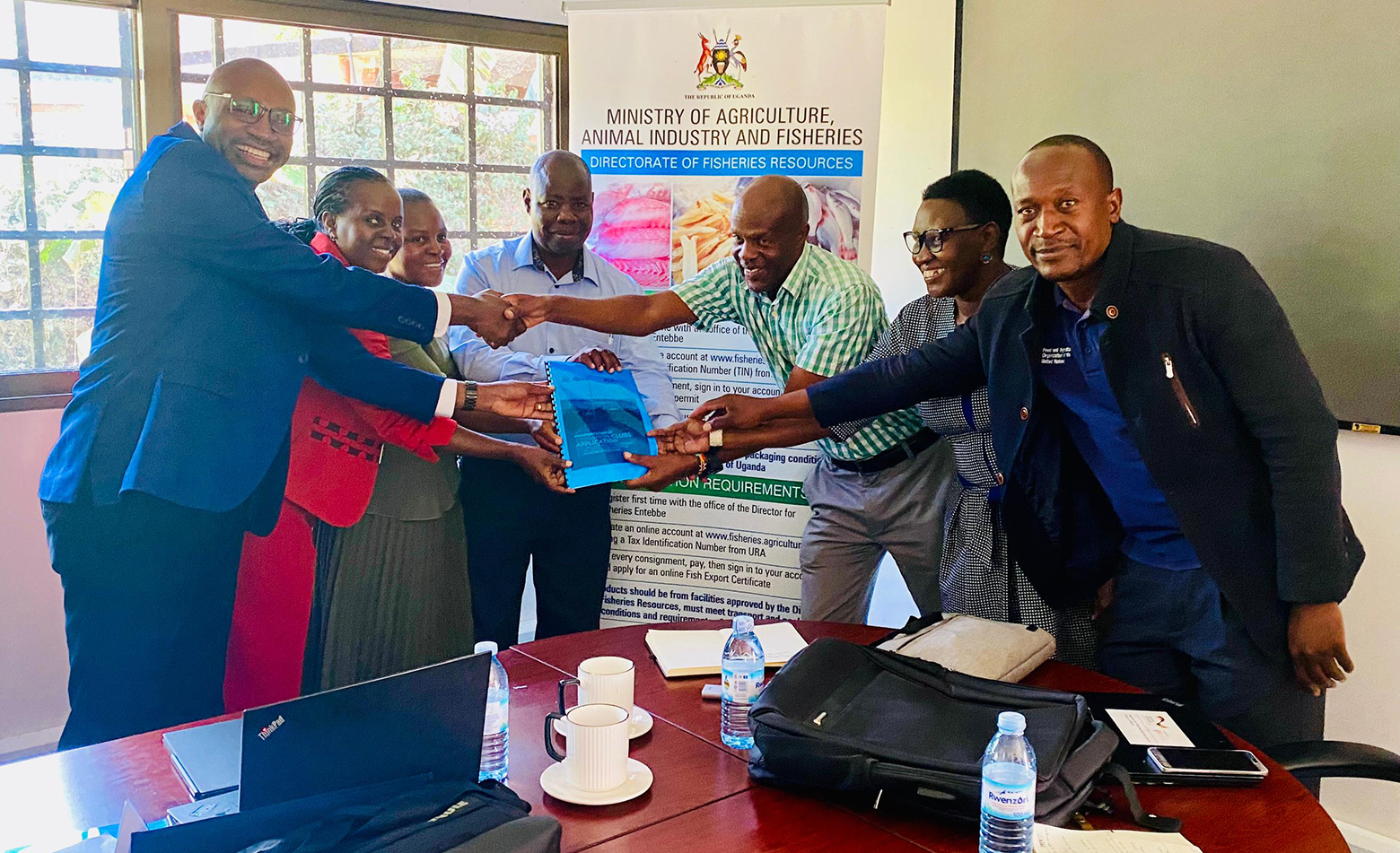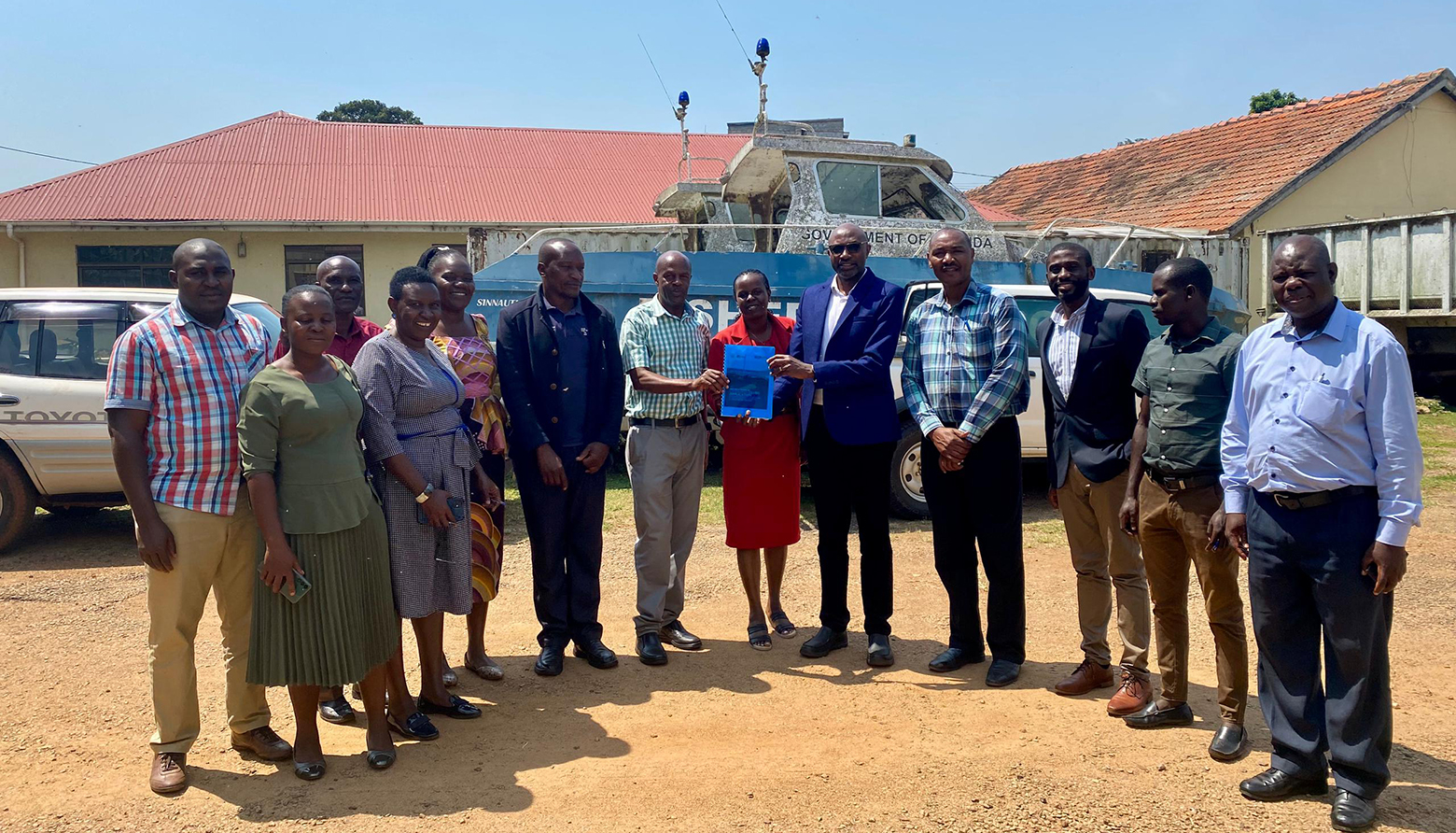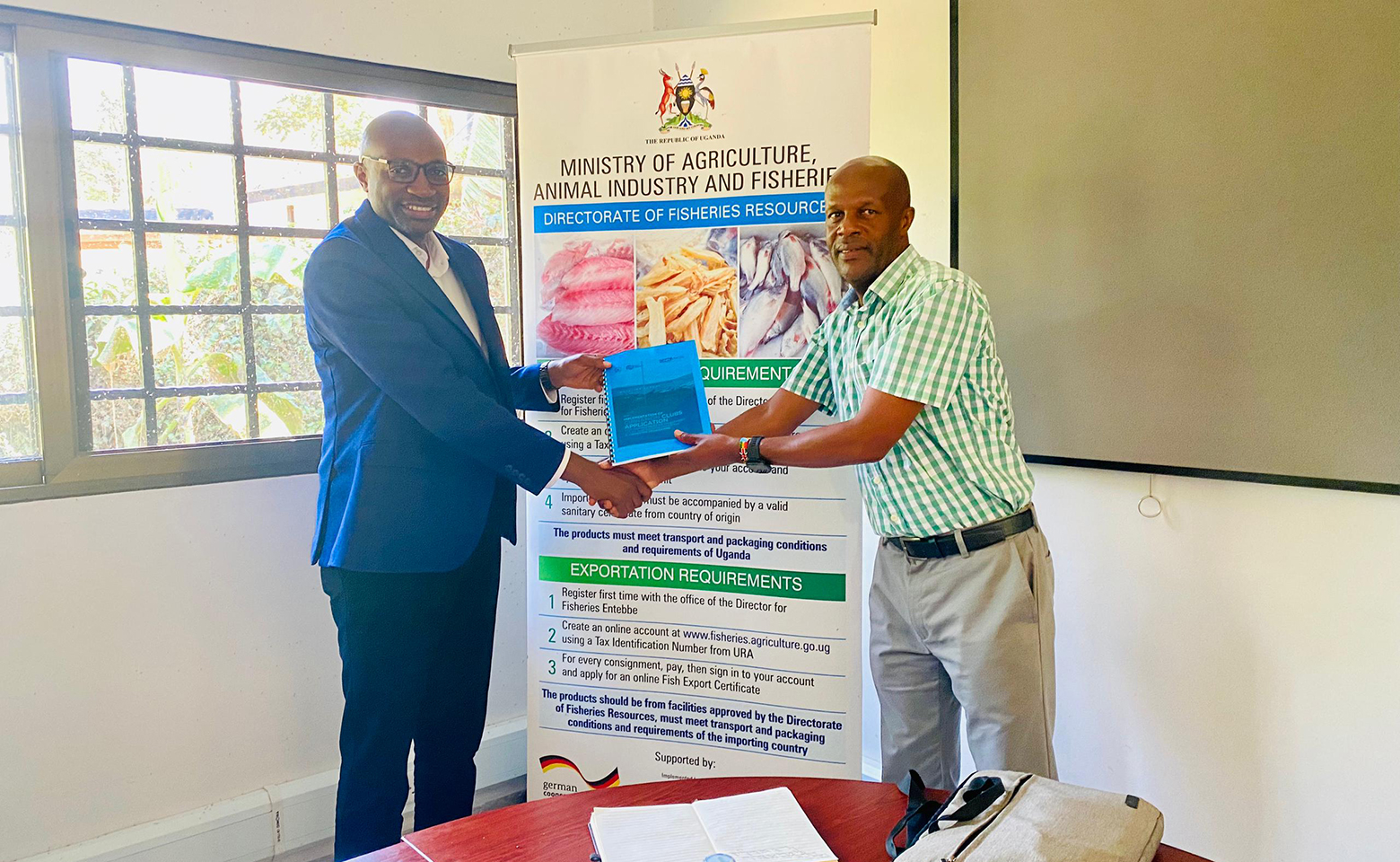A Uganda Communications Commission (UCC) funded project dubbed the e-booster Program has begun to bear fruit. The project, which is under the Uganda Communications Universal Service and Access Fund (UCUSAF) is aimed at supporting ICT solutions that address societal challenges in unserved and underserved areas of Uganda.
Cinnamon Solutions LTD, a Ugandan ICT company was among five companies selected through a competitive process, as a recipient of a grant to implement the initiative. Cinnamon will provide support in digitizing financial records of savings groups amongst fishing communities along the shores of Lake Victoria.
In a crucial first step in this initiative, Cinnamon has handed over the results of a baseline survey on the state of technology adoption in financial management amongst fishing communities along Lake Victoria to the Directorate of Fisheries Resources (DFR), under the Ministry of Agriculture Animal Industry and Fisheries (MAAIF) which is a key stakeholder in the fisheries industry in Uganda.
The report, commissioned by Cinnamon Solutions LTD was handed over to the Principal Fisheries Inspector, Mr. Alfred Akankwasa at the Directorate offices in Entebbe on Tuesday 2nd July 2024 by Cinnamon CEO, Mr. Dickson Mushabe.

In his speech, Mr. Dickson Mushabe appreciated the Directorate for taking an active role in the project as a key stakeholder in the fisheries industry in Uganda. He also expressed his hope that this would be the first of many initiatives to reach the underserved communities with digital solutions that would improve the lives of the people particularly through better financial management practices.
The survey, covering the districts of Mukono, Buikwe, Jinja and Masaka was carried out in collaboration with the Directorate and through the support and participation of the Fisheries Officers (FOs) at the different District Local Government landing sites. The FOs were central to introducing the project and the baseline survey exercise to the fishing communities in which they work.
The districts that were chosen were selected following criteria that included the level of economic activity, the infrastructural development in the location, socio-economic diversity, cultural diversity and also keeping in mind that the selection was a fair representation of all the geographical locations around Lake Victoria; North, East, West, South.
In introducing the report, Ms. Grace Ankunda who was the Survey fieldwork coordinator thanked the FOs for their support and assistance in enabling the field officials to carry out interviews within the fishing communities.
She expressed confidence in the integrity of the results from the work which was done, as having been carried out with uncompromising conformity to research standards and to the stated objectives.
In carrying out the research, focus group discussions were held that were deemed demographically representative of gender and age as well as the different stakeholders in the districts. Key informant interviews were also carried out with local leaders, government officials, representatives of financial institutions and other like-minded Community Based Organisations (CBOs).
Presenting the Baseline Survey Report, the Project Manager, Mr. Emmanuel Bwesigye outlined the reasons for the focus on fisheries communities. He highlighted the need for support in financial management, promoting savings and a shift in mindset away from living one day at a time, in these communities.

The survey aimed to assess the current situation regarding adoption and barriers to adoption of technology amongst the fishing communities. This was in regards to the extent of access to mobile phones, internet connectivity, automation tools and other technology infrastructure.
Findings indicated that most of the respondents (90%) owned a phone with 38% having a smartphone. However, only 10% always had internet connectivity with a majority of 62.4% never logging on to the internet. In addition, challenges and opportunities in financial management culture, practices and record keeping were assessed.
The survey found that more than 80% of the respondents were earning a monthly income of less than 500,000/=. Regardless of the relatively low income for the majority of the survey respondents, it was noted that most (77%) belonged to a savings group, with 78% of membership being to Village Savings and Lending Associations (VSLAs).
Financial records in the savings groups are primarily kept in paper based ledgers (93%) and cases of fraud and delayed payments were some of the issues raised to express dissatisfaction with this method of record keeping. Only 3% of the people interviewed participated in a savings group that used automated record keeping.
James Katali, the District Fisheries Officer for Buikwe expressed support for the initiative to raise awareness and promote good financial management practises saying that the issue of mindset change was key because it is one of the ways that fishermen would be sensitized on the new ideas of savings amongst them.

The objectives of the survey were assessed within the current socio economic context of the fishing communities. Regarding age range, the survey found that the majority of the people engaging in the fishing industry (64%) fall within the 25 to 44 years age range.
Although a significant number of the respondents had attained a certain level of formal education, only 4.3% had gone beyond secondary school, with the highest proportion, 44.6% having attained only primary level education. However, more than 67% of the respondents reported being able to read and write in either English or their local languages.
On fears expressed about technology related fraud, the study recommended implementing of robust systems and also engagement of local leaders as early adopters and champions to build trust and provide social proof on the benefits of technology.
Victo Bwoye, Fisheries Officer Jinja District expressed confidence that automating of financial records with the Cinnamon Clubs Application would put to rest the fears and suspicions regarding technology adoption as there would be complete transparency. She thanked the government of Uganda, and specifically UCC for providing funding support to the initiative to automate SACCOS.
Mr. Bwesigye concluded his remarks with a request to the FOs for continued support in identifying VSLAs and SACCOS that would benefit from the project and to continue promoting the initiative within their communities. The Fisheries Officers present appreciated the report stating that the findings were authentic in accurately representing the circumstances prevailing in the communities in which they worked.
Richard Ssazi, Assistant Fisheries Officer Masaka stated that the information that the report had brought out was factual and he expressed a desire to see that other groups formed under the Parish Development Model (PDM) would benchmark along the lines of this pilot project and adopt automation for themselves as well. He conveyed appreciation to UCC for funding the initiative and stated the commitment of the Fisheries Officers to working with Cinnamon to carry out the project.
The Principal Fisheries Inspector, Mr. Alfred Akankwasa expressed his appreciation to Cinnamon Solutions for the progress achieved. And he reiterated the hope that the initiative will deliver the expected impact in achieving better financial management within the fisheries communities.

